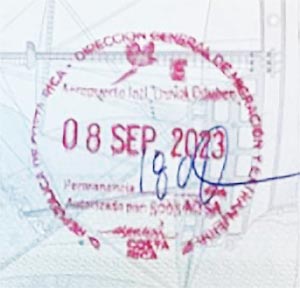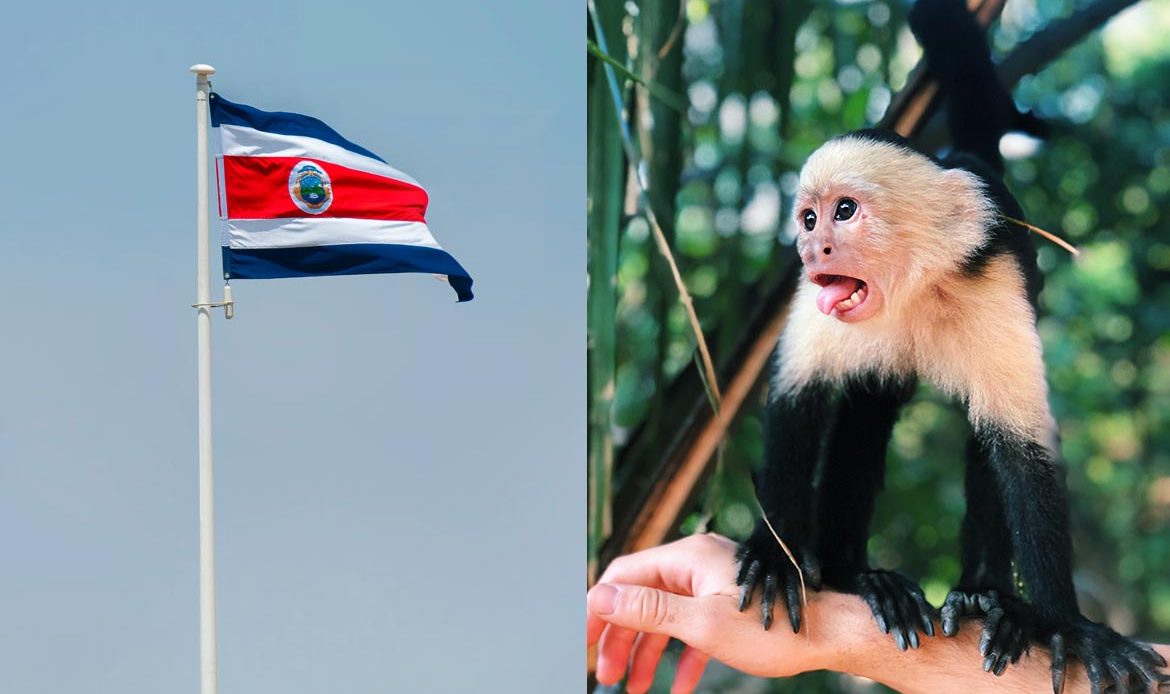In a recent development aimed at bolstering tourism and business visits, the government of Costa Rica has immediately (effective from 8th of September 2023) implemented a resolution that extends the maximum period of stay to 180 days of Tourist Visa in Costa Rica and business visitors from Group One countries, which include the United States and Canada among others. Prior to this change, the maximum duration of stay allowed for these visa-exempt individuals was limited to 90 days.

Detailed Analysis: What’s New and How It Affects Travelers, Locals, Business People and Residents
Doubling the Stay Duration from 90 days to 180 days Tourist Visa
This landmark resolution essentially doubles the time period visa-exempt visitors from Group One countries can spend in Costa Rica. What does this mean for travelers? Tourists now have ample opportunity to explore Costa Rica’s breathtaking landscapes, vibrant culture, and renowned biodiversity without feeling pressed for time. Meanwhile, business visitors working on long-term projects or considering Costa Rica as a potential investment location will find this extended period particularly beneficial.
Adding Layers to Decision-making: Navigating New Options
Though the extension in stay duration to 180 days of Tourist Visa seems favorable on the surface, it adds an extra layer of complexity for business travelers. Costa Rica also provides a ‘Visa for Remote Work – Digital Nomad‘ that comes with similar privileges and constraints, particularly concerning local earnings. Therefore, foreign nationals from Group One countries might find themselves in a more intricate situation when choosing between the various immigration pathways available for their business visit.
Which countries belong to Group One?
Currently the following countries belong to Group 1 that are eligable for the 180 days of Tourist Visa: Germany, Andorra, Argentina, Australia, Austria, Bahamas, Barbados, Belgium, Brazil, Bulgaria, Canada, Croatia, Chile, Cyprus, Denmark, United Arab Emirates, Slovakia, Slovenia, Spain, State of Qatar, United States of America, Finland, France, Hungary, Ireland, Iceland, Israel, Italy, Japan, Latvia, Liechtenstein, Lithuania, Luxembourg, Malta, Mexico, Montenegro, Norway, New Zealand, Netherlands, Panama, Paraguay, Poland, Portugal, Principality of Monaco, San Marino, Peru, Puerto Rico, Serbia, South Africa, Kingdom of Great Britain, Czech Republic, Republic of South Korea, Hellenic Republic (Greece), Romania, Vatican, Singapore, Sweden, Switzerland, Trinidad and Tobago, Uruguay

These can change at any time. For the most recent information visit the Costa Rican embassy of your country if applicable or contact your touristic service provider.
Eligibility and Exclusions: Who Qualifies and Who Doesn’t
It’s crucial to clarify that this elongated stay period is primarily aimed at travelers receiving their paychecks from foreign-based companies. If you are a business visitor intending to be remunerated by a Costa Rican firm, you are not eligible for this new status. Instead, such individuals must consult immigration professionals to determine the most suitable visa category for their specific activities, such as a Short-Term Visa (Visa de Estancia) or Temporary Residence.
The Economic Implications and Strategic Goals
Reviving the Tourism Sector
The extension of the allowable stay period is not an isolated decision but forms part of the Costa Rican government’s overarching strategy to revamp its tourism industry. The industry has long been a cornerstone of the country’s economy, offering a plethora of outdoor activities, ecotourism experiences, and cultural festivals that attract millions of visitors every year.
The Economic Ripple Effect
Data collected by the General Immigration Directorate shows that Group One countries significantly outpace other groups in terms of economic contribution to Costa Rica. Extending the maximum period of stay can, therefore, have a ripple effect on local businesses, from hotels and restaurants to tour operators and other service providers.

Anticipating Further Changes: What Lies Ahead?
Proposed Income Requirement Changes for Remote Workers
Even as these new changes are implemented, the government has additional reforms in the pipeline. One proposal currently under consideration by the Costa Rican Legislative Assembly is to lower the minimum income requirements for those applying for the Short-Term Visa for Remote Workers or Service Providers. If approved, the income threshold would drop from USD 3,000 to USD 2,000 (or from USD 4,000 to USD 3,000 for those with dependents).
Continuing to Adapt and Evolve
Given Costa Rica’s proactive approach to evolving its immigration policies, it’s reasonable to anticipate further adjustments designed to make the country increasingly attractive for tourists and business travelers alike.
Driving Rules Unaffected by New Visa Extension (for now)
Although the visa period has been extended to 180 days for visitors from Group One countries, the regulations concerning driving with an international driver’s license in Costa Rica have not been altered. Foreign visitors are still only permitted to drive for a maximum of 90 days. After this period, they must leave the country to renew their visa. The 90-day limitation on foreign licenses is dictated by a specific provision in the existing law, by a different regulatory government body.
If stopped by the police, you will be asked to show both your international driver’s license and your passport to confirm the date of your latest visa entry. Driving past the 90-day limit is considered unlawful, and law enforcement officers have the right to seize your car’s license plates under such circumstances. To retrieve them, a border exit and visa renewal are required, which could also entail significant fines.
For those who own vehicles in Costa Rica, the new 180 days of Tourist Visa policy is unlikely to affect your driving permissions. Unfortunately, the requirement to exit the country every 90 days to maintain driving eligibility remains in place.
Recommendations
Summary of the Extended Stay Period to 180 days of Tourist Visa in Costa Rica
The decision to extend the maximum period of stay for Group One visitors represents a significant shift in Costa Rica’s efforts to stimulate its economy and attract international interest. As such, travelers need to be aware of these changes and how they can take advantage of them.
Stay Updated and Plan Accordingly
For the most accurate and timely information, it’s highly recommended to consult with global immigration professionals. For specific inquiries, you can direct your questions to info@expat-tations.com or download our app for Iphone/Ipad or Android.
Costa Rica’s new policy is more than just an extension of time—it’s a clarion call to the international community, signaling that the country is open for more extended visits, be they for leisure or business. This change is indicative of a broader pattern of regulatory adjustments aimed at making Costa Rica an increasingly attractive destination on the global stage. With its diverse offerings ranging from tropical landscapes to business opportunities, Costa Rica is positioning itself as a go-to destination for a wider array of international visitors.
Exploring the Potential Impact on the Real Estate Market
Vacation Rentals and Property Investments
Another facet of the economy that could benefit from this policy change is the real estate market, particularly in the realm of vacation rentals and property investments. With the extension of the stay period, tourists may become more inclined to explore longer-term vacation rentals, boosting demand for such properties. Additionally, business travelers spending more extended periods in the country could also serve as potential investors in Costa Rica’s burgeoning real estate market.
Appealing to Digital Nomads
The trend of remote work has produced a new class of travelers—digital nomads—who have the flexibility to work from anywhere. By extending the stay period to 180 days of Tourist Visa for visitors from Group One countries, Costa Rica is likely positioning itself as an attractive destination for digital nomads, who often prefer longer stays and may even consider investing in local real estate for semi-permanent residence.
Understanding the Social and Cultural Impact
Enhanced Cultural Exchange
The new extended-stay policy (180 days of Tourist Visa) not only has economic benefits but also has the potential to enrich cultural exchanges between visitors and locals. Longer stays mean more time for travelers to immerse themselves in Costa Rican culture, and similarly, for locals to gain exposure to various international perspectives.
Sustainability Concerns
However, it’s important to consider the sustainability aspect as well. With the increased number of tourists and longer stays, there will be a heightened need for responsible tourism practices to protect Costa Rica’s famous natural landscapes and biodiversity.
Final Thoughts: How to Stay Informed and Make the Most of Your Trip
Continuous Updates
As Costa Rica continues to revise and update its immigration and tourism policies, staying updated is crucial. Subscribing to reliable travel advisory services or periodically checking official websites can keep you informed of any changes or additional reforms.
Consult Experts
Before planning any extended stays, either for tourism or business purposes, it’s advisable to consult with immigration experts to navigate the complexities of these new policies effectively. Immigration professionals can provide personalized guidance tailored to your specific situation and travel objectives. For specific inquiries contact us or download our app for Iphone/Ipad or Android.
Take Your Time to Explore
With these new policies in place, there’s never been a better time to fully explore what Costa Rica has to offer. From its stunning beaches and lush rainforests to bustling cityscapes and burgeoning business opportunities, the extended stay period opens up new possibilities for a more enriching experience in Costa Rica.
By implementing these sweeping changes, Costa Rica is sending a message to the world: it is not just a place for quick visits but a country where extended stays are not only possible but encouraged. Whether you’re a business traveler, a tourist, or somewhere in between, Costa Rica’s new 180 days of Tourist Visa policy invites you to explore, connect, and maybe even invest in a destination that is continuously evolving to meet the needs of its international visitors.



